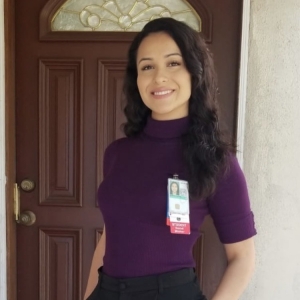Meet Military Social Work Student Noemi Moreno
March 04, 2019- Students
MSW student Noemi Moreno shares her unique perspective as a civilian pursuing the military social work track at the USC Suzanne Dworak-Peck School of Social Work.
While the majority of MSW students studying military social work at the USC Suzanne Dworak-Peck School of Social Work are service members and veterans themselves, military social work can be just as rewarding a career path for those who don’t come from a military background. Just ask Noemi Moreno.
“I try to approach military social work with an understanding that I have something valuable to offer veterans, and they have something valuable to offer me,” she said. As a civilian MSW student on the military social work track, Moreno shared her unique perspective on military social work and her experience serving veterans.
USC Suzanne Dworak-Peck School of Social Work: As a civilian student, you are unique from many of your military-affiliated classmates. How did you become interested in the field of social work in general, and military social work in particular?
Noemi Moreno: While pursuing my undergraduate degree at Bryn Mawr College in Pennsylvania, an advisor helped me secure an internship at The Soldier’s Project, a nonprofit organization providing free psychological counseling to veterans and their families. The director of The Soldier’s Project encouraged me to consider applying to the USC Suzanne Dworak-Peck School of Social Work for graduate school.
I was studying psychology at the time, but after volunteering with children during my study abroad program in Spain and with veterans in the emergency room at a VA hospital, I began to realize how much I loved helping others. In particular, hearing veterans’ stories first-hand piqued my interest in working with military communities.
During my senior year at Bryn Mawr, I had the opportunity to conduct research on women veterans and barriers to gender-specific health care through the Veterans Health Administration (VHA). My advisor connected me with Carl Castro, the director of the USC Center for Innovation and Research on Veterans & Military Families (CIR). After a lot of reflection, I decided I wanted to pursue my social work education at USC.
USC: What research opportunities and field placements have you sought out at USC, and how have these experiences confirmed that military social work is the right fit for your skills and interests?
NM: I approached Research Associate Professor Sara Kintzle about potential research opportunities because her professional background aligns with my interest in military sexual trauma and issues affecting women service members and veterans. She helped me secure a research role at CIR working under Castro.
This year, my field placement is with the VA Long Beach Healthcare System. I’m the only civilian student who was chosen as an intern from USC this year, which has made my experience unique. Being a civilian in military social work is a kind of double-edged sword—at times it has intimidated me and made me feel as though I was ‘on the outside,’ but I’ve learned that it can be a real advantage. For example, at VA Long Beach, veterans sometimes feel more comfortable opening up to me rather than to a fellow military veteran because of the stigma of expressing certain emotions or opening up about traumatic experiences.
USC: How have your experiences in the classroom and in the field shaped your career ambitions?
NM: After completing internships in both the nonprofit and federal sector, I’ve decided that I’d like to work on the federal side because it’s a large, well-structured network that offers more opportunities in line with my interests. I’ve applied for a full-time role with the VA, but I am also considering the Los Angeles County Department of Mental Health.
Regardless of where my career may take me, my priority is working with veterans. They have made so many sacrifices for our well-being—it seems the least I can do is give back to them.
USC: What advice would you offer to other civilians considering pursuing military social work?
NM: As long as you are passionate about serving the military community, a lack of military background won’t hinder your ability to be an effective advocate and agent of change within this community.
At the same time, it’s important to be aware of the limitations that come with being a civilian among service members and veterans, and to educate yourself as much as possible about the experience of serving in the military. Aim to cultivate a deep sense of empathy that will enable you to become a better advocate for the military community.
Anyone interested in pursuing an MSW should come prepared for a life-changing experience. Before I came to USC, I could not have anticipated the degree to which learning about serious social issues and becoming an advocate for those on the margins of society would affect my understanding of the world. It has been completely transformative and humbling, to say the least.
To reference the work of our faculty online, we ask that you directly quote their work where possible and attribute it to "FACULTY NAME, a professor in the USC Suzanne Dworak-Peck School of Social Work” (LINK: https://dworakpeck.usc.edu)
